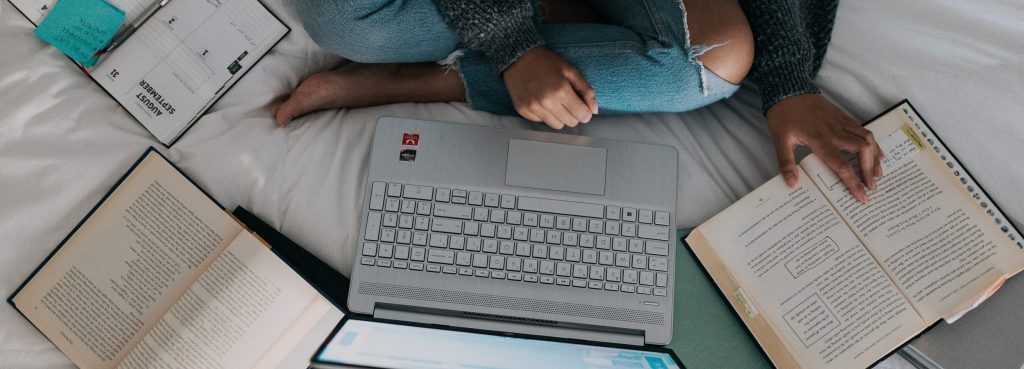The recent news that LSE’s January exams would be held virtually certainly comes as a disappointment for those of us who were getting reacquainted with in-person teaching and learning. Rising COVID cases and a more contagious variant has many wondering what this entails for the fate of in-person instruction and social activities. Though it is unclear how things will play out over the weeks to come, in the meantime I thought I would share some advice on working and studying remotely that has really helped me throughout the pandemic.
1.
Try to (realistically) recreate the routine you would have had during a normal day that would involve commuting to campus. For me, this means changing out of the clothes I would normally wear when just lounging around at home, as it tricks my brain into thinking that I’m going to class and that it’s time to be productive. I’m sure there’s actual psychology behind this that’s far beyond my surface knowledge but recreating my daily morning routine helps me retain at least some structure during a day where I might be stuck at home.
2.
If working from home, try to create a distinct workspace in your accommodation. Try to simulate the physical separation that you’d have between your home life and the time you spend resting with the space you use to do work. I tend to be more productive when studying at the library (again, I’m sure there’s actual psychology behind this), but I’ve found that going into my hall’s common room for a change of scenery helps as well. Studying as far away as possible from my bed also ensures that I’m not tempted to waste time lying around on my phone.

3.
Don’t underestimate the value of a clean and distraction-free workspace. Though it’s difficult at times, I try to keep my desk as clean and distraction-free as possible so that I can concentrate on the tasks at hand. This applies to my digital workspace as well. Every month, I’ve made it a habit to go through old files that I have had downloaded on my computer’s hard drive, clearing out anything that isn’t useful. In addition to making it easier to find any new files you might need for your job or for schoolwork, deleting old files also increases the processing speed of your computer.
4.
Write tasks down, and by tasks, I mean any obligation that you have for the day, no matter how small. If it’s something you have to do— whether it’s reminding yourself to take a daily vitamin, drop something off at a post box, or write a draft of a thesis— write it down. Since everything nowadays is so digitized, a lot of our daily tasks and work can feel fleeting and impermanent. Having an actual, paper to-do list, journal, or planner is a physical testament to the day’s productivity. The satisfaction from seeing the tasks I had to do for the day all crossed out after completion is a great motivator.
5.
Take breaks that involve physical activities instead of mental ones. Staring at a computer can make my eyes feel terrible by the end of the day, so taking an hour to go outside, get some fresh air, and go on a walk is a really valuable activity that I make an effort to do every day. If I’ve spent the last four hours working on an essay, I have to tell myself that the extra fifth hour probably won’t be as productive as the first four due to the mental fatigue that sets in after working on something for a prolonged period. That extra hour would probably be better spent taking a break so that I can return to my work feeling refreshed and energized. Even menial tasks— folding clothes or cooking something— can serve as a sort of mental reset that allows me to sit alone with my own thoughts and enjoy the comfort of solitude.

6.
Put your phone in another room. I’m serious. There’s really no way around it. I know it’s not the most fun advice to hear, but it’s the advice I’ve found to be the most helpful in studying efficiently and preventing distractions. If you live in a shared hall and only have access to one room, put your phone in a drawer and tell yourself that you won’t look at it until the day is over. I’ve also found disconnecting my computer from wifi helps as well, since I sometimes get distracted by incoming notifications.
7.
Schedule time for specific activities that don’t involve work. There’s an old saying that “work expands so as to fill the time available for its completion,” and in the context of studying, I’ve definitely found it to be true. If I tell myself that I’ll dedicate an entire day to studying, I inevitably end up spending four of the eight hours I’ve set aside getting distracted and not doing my work, while telling myself that I still have a ton of time left in the day to complete it. Instead, if I’ve scheduled a coffee date with a friend or time calling my parents, the fact that I have something else planned for that day serves as positive pressure to stay focused and efficient, as I know that I have a limited amount of time available.
Though rising cases and the recent news of online assessment this January are certainly dismaying, I hope the above advice can help you stay safe, sane, and productive during the upcoming semester.
You can read more about LSE’s latest COVID safety measures on the community advice and guidance webpage.





